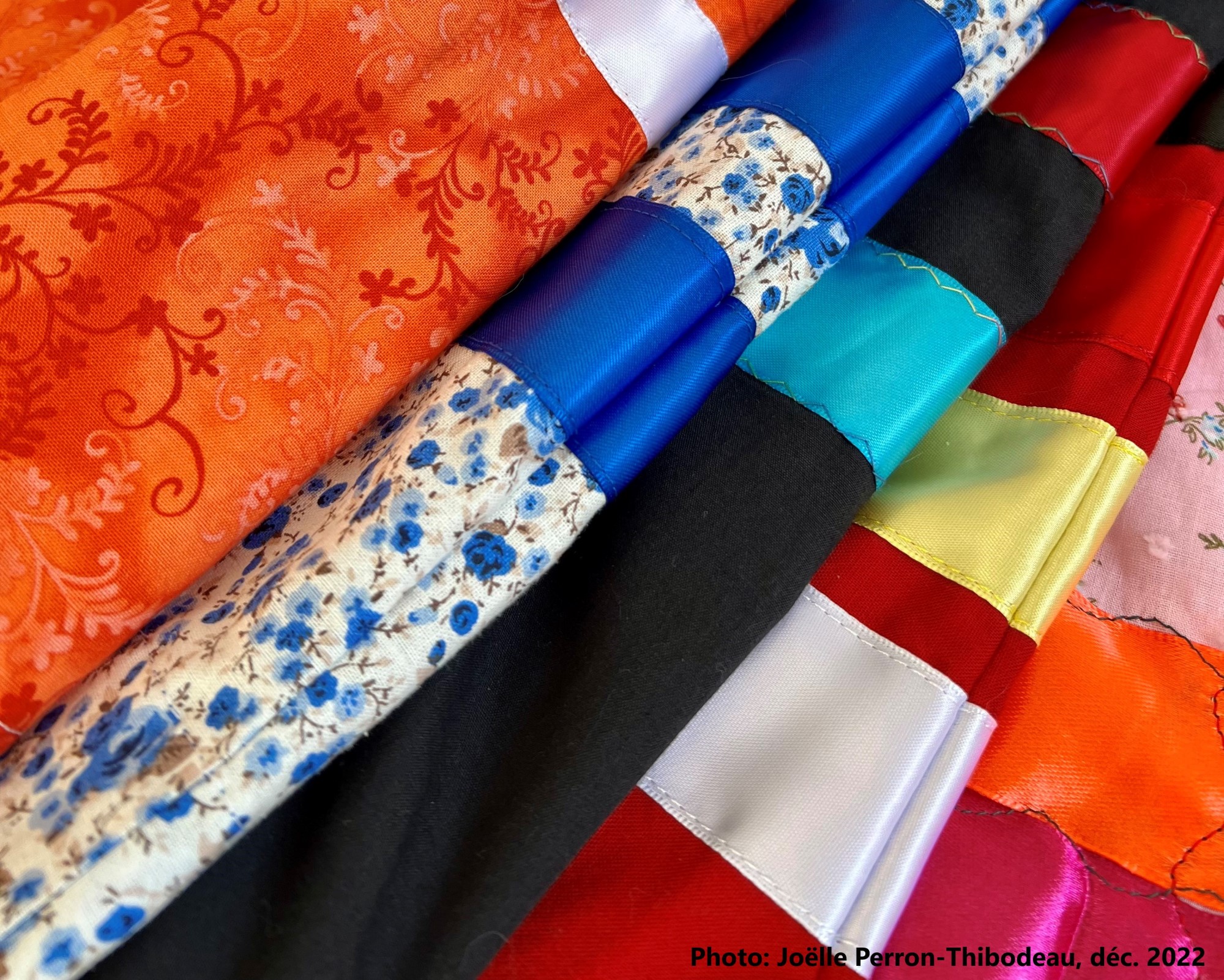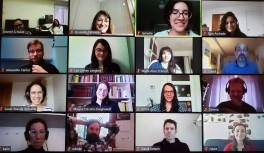The Court of Appeal issued its decision in the class action brought by Atikamekw women
On February 12, 2025, the Court of Appeal issued its decision in the class action brought by Atikamekw women who claim to have undergone sterilization procedures at the CISSS de Lanaudière without their free and informed consent. It allowed the appeal of the representatives, U.T. and M.X., and dismissed the appeal of the doctors, thus authorizing the class action against the CISSS de Lanaudière and the doctors.
The first-instance decision of the Superior Court of Quebec from August 16, 2023, had rejected any link between alleged systemic racism at the Joliette hospital and forced sterilizations. However, the Court of Appeal found that the representatives’ argument regarding the direct responsibility of the CISSS and its employees was neither frivolous nor manifestly unfounded.
The Court of Appeal therefore recognized that the allegations against the CISSS regarding the lack of measures to curb the systemic racism that allowed the sterilizations to be carried out with impunity, the failure to provide adequate and safe care, and the inaction of its employees were not unreasonable and that the members of the class should have the opportunity to raise them in the context of this class action.
The Court also confirmed that the action raises issues common to both the CISSS and the doctors, such as the lack of consent given the practice of forced sterilizations, the doctors’ modus operandi, and the discriminatory nature of this practice.
The certification of this class action contributes to access to justice by preventing victims from bearing the burden of complex litigation alone.
2024 Edition of the strategic day organized by Open Forum
On December 2, 2024, Sara Andrade and Rose Victoria Adams participated in Open Forum’s strategic day on consultation and accommodation with Indigenous ommunities. It was an opportunity for participants to have a meaningful dialogue on the implementation and development of the duty to consult Indigenous peoples.
Sara Andrade and Rose Victoria Adams presented on “The Implementation of UNDRIP and its Impact on Consultation and Participation: a Look at Nunavik”. They discussed land co-management and the future of projects in Nunavik in the context of implementing the United Nations Declaration on the Rights of Indigenous Peoples.
Dionne Schulze thanks OPEN FORUM for the invitation to participate in the 2024 edition of this strategic day.
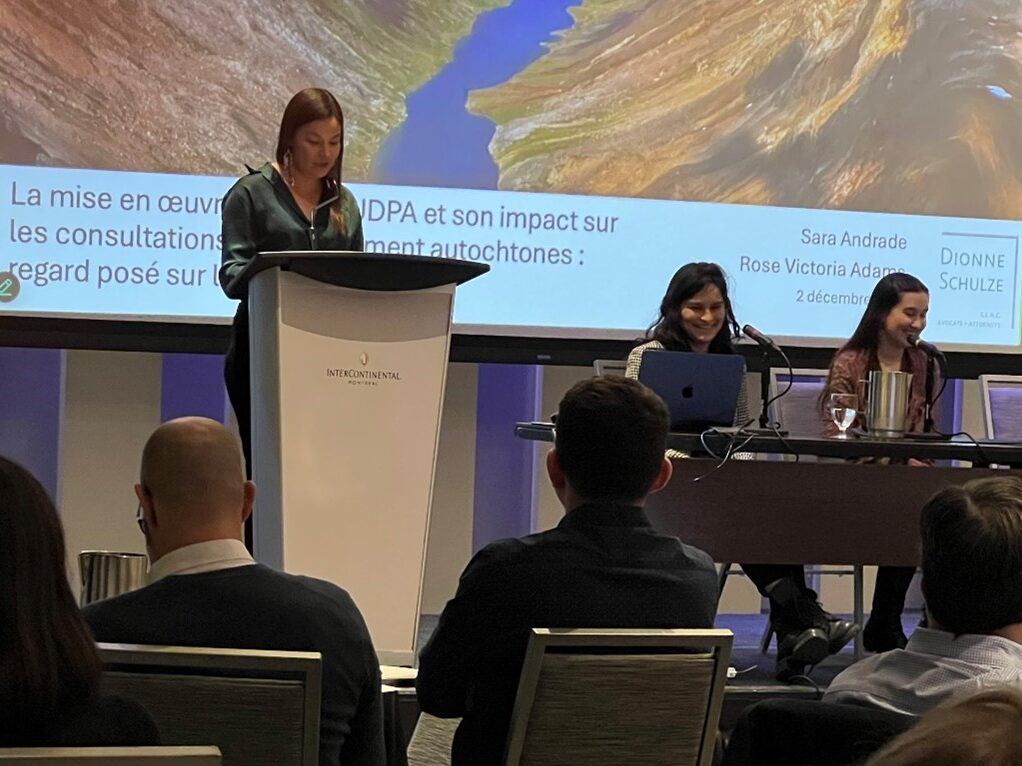
Start Of Claims Process For The Indian Boarding Homes Class Action
Members of the Percival Class Action lawsuit regarding the Indian Boarding Home Program may file claims starting today until February 22, 2027.
This Class Action seeks to compensate Indigenous people who were placed with a family by the Government of Canada between September 1, 1951 and June 30, 1992, for the purpose of attending an elementary or secondary school (whether in an Aboriginal or urban community).
The Settlement Agreement includes:
- Category 1: $10,000 for placement in the Boarding Homes Program;
- Category 2: Additional compensation between $10,000 and $200,000 for abuse suffered during the placement.
To find a lawyer, you can contact us at 1-888-232-3778 or at .
Forms are available on the Class Action lawsuit website: https://boardinghomesclassaction.com/
Answers to the most frequently asked questions about the Settlement Agreement and the claims process are available in the FAQs: https://boardinghomesclassaction.com/faqs/
You can also find emotional and mental health resources here: https://boardinghomesclassaction.com/resources/
Finally, you can follow the Class Action Facebook page for additional information: https://www.facebook.com/IBHClassAction/
Indian Boarding Homes Class Action
Notice of settlement of the Percival Indian Boarding Homes class action, for which Dionne Schulze acts as counsel for the Quebec subclass, was published on May 21, 2024. This class action seeks to compensate individuals placed with a family by the government of Canada, for the purpose of attending elementary or secondary school (whether in an Aboriginal or urban community), between September 1, 1951 and June 30, 1992.
Class members will be able to apply for compensation under the settlement agreement starting August 21, 2024, when claim forms will become available on the https://boardinghomesclassaction.com/ website. Class members will have until Monday, February 22, 2027 to submit their claims. If they instead wish to opt out of the settlement agreement, they will have until Monday, July 22, 2024 to do so.
Dionne Schulze was counsel for the late Kenneth Weistche, who was the representative plaintiff for the Quebec subclass members of the class action. Following his untimely death on November 24, 2023, his wife, Annie Trapper Weistche, replaced him. Since March 5, 2024, Annie Trapper Weistche is representative plaintiff for the Quebec subclass.
Dionne Schulze will represent the Assembly of First Nations of Québec-Labrador before the Supreme Court of Canada
Dionne Schulze is honoured to represent the Assembly of First Nations of Québec-Labrador in its intervention before the Supreme Court of Canada | Cour suprême du Canada in the case of Attorney General of Québec v. Pekuakamiulnuatsh Takuhikan.
This case concerns the funding of the First Nations Policing Program (FNPP) in Canada and the constitutional obligations of Quebec and Canada to provide adequate support to Indigenous policing services.
Marie-Eve Dumont will appear for the Assembly of First Nations of Québec-Labrador at the appeal hearing on April 23.
The Supreme Court of Canada’s decision in this case may have important implications for the funding of Indigenous policing services and the interpretation of contract between the Crown and First Nations in Canada.
For more information: https://www.canadianlawyermag.com/news/general/scc-hearing-case-with-implications-for-government-funding-of-first-nations-police-services/380588
First Additions to Reserve Policy Redesign Engagement Session
David Schulze is proud to have been invited to participate in the first Additions to Reserve Policy Redesign Engagement Session held in Montreal by the First Nations Lands Managers Association for Quebec and Labrador.
A second session is scheduled for April in Wendake. The recommendations resulting from these discussions will then be presented to Crown-Indigenous Relations and Northern Affairs Canada.
The nominations for the 2024 edition of the Canadian Legal Lexpert Directory
The nominations for the 2024 edition of the Canadian Legal Lexpert Directory have finally been announced.
We are proud to be listed as one of the most frequently recommended Quebec law firms in Aboriginal law. Thanks to our peers for recognizing our lawyers’ deep expertise and commitment to legal excellence.
Congratulations to David Schulze, Elisabeth Patterson and Jameela Jeeroburkhan for once again being recognized by their peers for their expertise in Aboriginal law!
Workshop on Indigenous class actions during the Focus Week
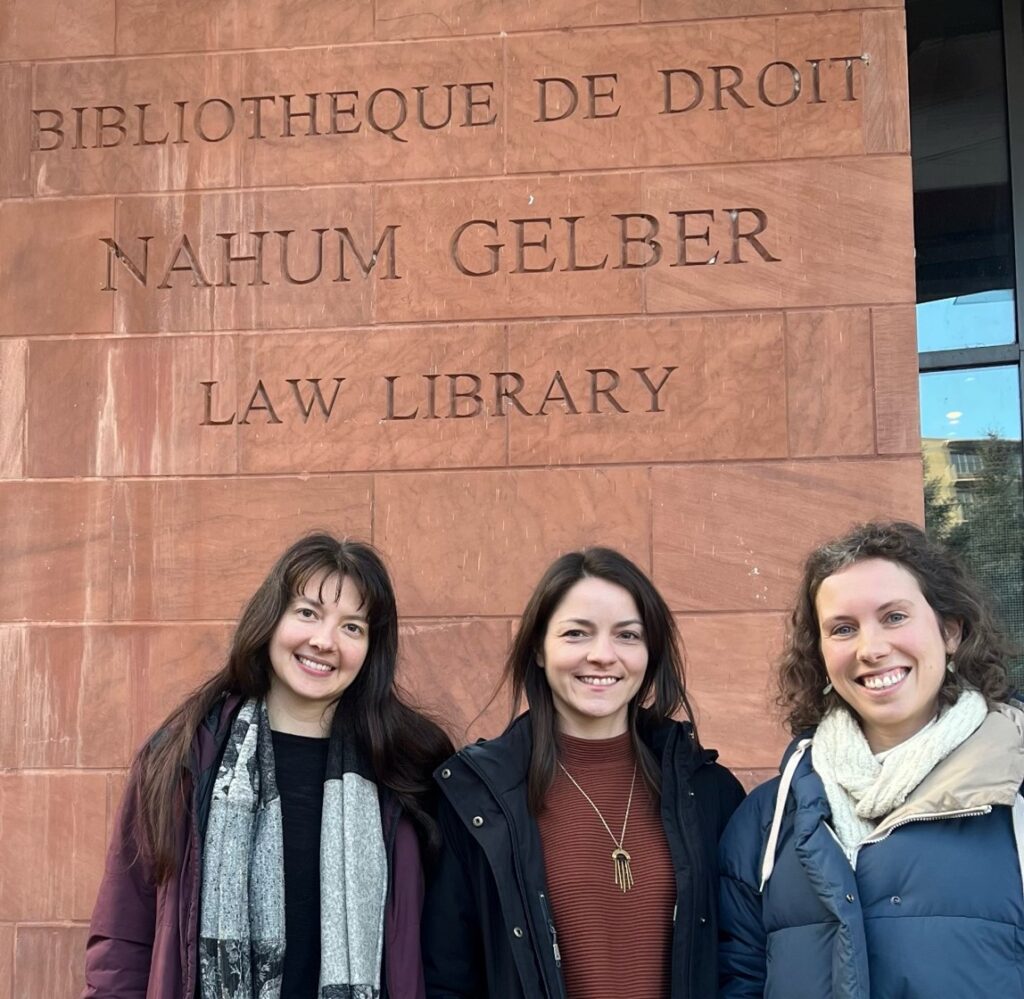
Dionne Schulze is proud to have organized a week-long workshop on Indigenous class actions, which took place at McGill University’s Faculty of Law from February 26 to March 1, 2024, as part of Focus Week.
Marie-Alice D’Aoust, Sarah-Maude Belleville-Chénard, and Léa Lemay Langlois worked with the 16 students enrolled in the workshop to explore the potential of class actions in the Indigenous context to redress the historical wrongs of colonialism in Canada, particularly in the areas of health, education, and child services.
They explored from a critical perspective the legal, political, and ethical issues raised by the use of class actions as a procedural tool in the context of systemic harms in an institutional context. The workshop emphasized skill building for a trauma-informed approach to the legal profession.
The week concluded with a simulated negotiation exercise in which students were given an opportunity to apply ethical and legal principles as well as specific negotiation techniques learned in class to develop a draft settlement agreement for a fictional class action lawsuit concerning Indigenous health policy.
Interview with Joëlle Perron-Thibodeau on the radio show Kwé, Bonjour
On January 20, the radio show Kwé, Bonjour hosted Joëlle Perron-Thibodeau to talk about justice and comment on the recent Quebec Superior Court decision R. v. Montour. During this interview with Sophie-Claude Miller and Sylvestre Desterres, Joëlle Perron-Thibodeau shared about her career as a Kanien’kéhà:ka lawyer, and presented various aspects of the decision, including the place of traditional #Indigenous systems in analyzing relations with the Crown as well as the new test to prove an #aboriginal right.
To quote paragraph 458 of the decision: “In the culture of the Haudenosaunee, there is a golden thread that runs through generations. It weaves together their desire, their efforts and their determination through all those years to live in peace.”
You can listen to Joëlle Perron-Thibodeau here: https://canalm.vuesetvoix.com/limportation-de-tabac-a-kahnawake/
Kanien’kehá:ka (Mohawks) have an aboriginal right to freely pursue economic development
A turning point in the history of Aboriginal law: Two decades after the Mitchell decision, a Quebec court has made an exceptional turnaround. Quebec Superior Court Justice Sophie Bourque concluded that the Kanien’kehá:ka (Mohawks) have an aboriginal right to freely pursue economic development.
Taking into account the entry into force of the Canadian Act respecting the United Nations Declaration on the Rights of Indigenous Peoples (UNDRIP), and the societal shift towards reconciliation, the Court considers that the criteria for departing from the precedent set in 1996 by the Supreme Court in Van der Peet have been met, and determines a new test for the judicial recognition of Aboriginal rights. Although under appeal, this major decision, commented on by our lawyers Elisabeth Patterson and Joëlle Perron-Thibodeau in the article “A new era in Canadian law” in the Canadian Bar Association National Magazine, will assuredly help reshape the foundations of Aboriginal law in Québec and in Canada.
To access CBA National Magazine article “A new era in Canadian law” by Doug Beazley: https://www.nationalmagazine.ca/en-ca/articles/law/in-depth/2023/a-new-era-in-canadian-law
Dionne Schulze named as one of the Canada’s Best Law Firms
We’re proud to be recognized once again by The Globe and Mail as one of Canada’s best law firms in Aboriginal Law and/or Indigenous Law. Congratulations to all of our lawyers who have contributed to this recognition: Jameela Jeeroburkhan, David Schulze, Elisabeth Patterson, Marie-Eve Dumont, Nick Dodd, Maryse Décarie-Daigneault, Léa Lemay Langlois, Sarah-Maude Belleville-Chenard, Sara Andrade, David Janzen, Joëlle Perron-Thibodeau, Marie-Alice D’Aoust, Rose Victoria Adams and Wade MacAulay.
Congratulations to all firms recognized! 👏
Civil Law Symposium “The most difficult, is to dare”
On October 27th and 28th, the Université de Montréal hosted a Civil Law Symposium organized by the Black Law Students’ Association of Canada under the theme “The most difficult, is to dare”.
As a sponsor of this 8th edition, Dionne Schulze is proud to have contributed to the success of this event. Congratulations to all who contributed to the success of this event! 👏
Indigenous fishing rights
On October 21, 2021, the Southern Gaspésie Professional Fishermen’s Association (“Regroupement des pêcheurs professionnels du sud de la Gaspésie”), the Maritime Fishermen’s Union, the Prince Edward Island Fishermen’s Association and the Gulf Nova Scotia Fleet Planning Board asked the Federal Court to invalidate the 2021 Fisheries Rights and Reconciliation Agreement between the Listuguj Mi’gmaq Government and Canada. This five-year agreement establishes shared and collaborative fisheries management between the Mi’gmaq community and the federal government.
On October 12, the Federal Court agreed to hear some of the plaintiffs’ claims on the merits. The claims regarding the recognition of rights granted under the agreement were declared invalid by Justice William F. Pentney, who noted that the federal government has the power to recognize and give effect to ancestral and treaty rights. Such rights that have been recognized by the federal government are protected by section 35 of the Constitution, even if they have not yet been recognized or upheld by a court.
However, the Court upheld the claim that the non-Indigenous fishermen were not consulted in the process of reaching the agreement, while they had the right to act in the public interest. However, the judge specified that the law had not yet established the criteria for such a consultation and the obligation to include non-Indigenous persons who have an interest before reaching an agreement.
In addition, the judge pointed out that if ministers had an obligation to involve the claimants in the process of negotiating an agreement, that obligation was in no way equivalent to the constitutional duty to consult Aboriginal peoples.
According to Mr. David Schulze, the question of consultation with non-Indigenous peoples is limited in scope, as consultation with non-Indigenous fishermen would likely not have changed the content of the agreement between the federal government and the Mi’kmaq community.
To read more: click here (in French only).
Traditional knowledge of Indigenous peoples and biopiracy
In French Guyana, Quassia amara, known locally as Couachi, is known for its antimalarial properties. This plant was patented in 2018 by the Institut de recherche pour le développement (IRD). However, this plant was identified by scientists thanks to the traditional knowledge of Guyana’s Indigenous peoples.
Although IRD finally abandoned the patent three years ago, Guyana’s Indigenous peoples continue to fight for recognition of the contribution of their traditional knowledge, since the patent is still considered valid. The Indigenous peoples of French Guyana see this patent as a case of biopiracy: their ancestral knowledge has been confiscated by laboratories linked to multinational corporations, while excluding the true authors of the discovery. They argue that the patent is illegal because it was drafted without regard for the rights of Indigenous peoples recognized by international treaties and, more importantly, because it violates the 2017 Law on Biological Diversity.
In Quebec, research on traditional knowledge used to treat the symptoms of diabetes was conducted by the Cree and researchers from McGill University, the University of Ottawa and Université de Montréal (UdeM). In 2009, the Crees signed a research agreement which respects the Eeyouch’s inherent right to intellectual property arising from collective knowledge to protect against biopiracy. In addition, the agreement, negotiated with the help of Elisabeth Patterson, stipulated that the Crees had a veto over all of the research group’s publications and could refuse to move toward commercialization. If they agreed, commercialization could only take place through a non-profit corporation.
It should be noted that although the agreement was not renewed, the scientists did publish.
See: https://ici.radio-canada.ca/espaces-autochtones/2015738/biopiratrie-connaissances-autochtones-medecine-brevet (in French only)
Lawsuit class action – U.T. et M.X. c. Richard Monday et al.
Plaintiffs U.T. and M.X. are leading a class action on behalf of Atikamekw women who underwent procedures that impaired their fertility at the CISSS de Lanaudière (Joliette hospital) without having given their free and informed consent, particularly because of systemic discrimination.
The class action was certified by the Superior Court of Quebec on August 16. For more information: Quebec judge authorizes class action by Atikamekw women alleging forced sterilizations
Compensation for victims of First Nations Child and Family Services
On July 26th, the Canadian Human Rights Tribunal approved a new compensation deal for victims of Canada’s First Nations child-welfare system. The Tribunal had previously found that the government discriminated against First Nations children and youth by underfunding on-reserve child and family services and by failing to pay essential healthcare costs.
The $23 billion package is the long-awaited culmination of a 16-year legal battle between the federal government and two First Nations organizations (the Assembly of First Nations (AFN) and the First Nations Child and Family Caring Society of Canada). The settlement is intended to provide compensation for approximately 300,000 First Nations children, youth, and families who experienced systemic discrimination and racism from 1991 onward. The deal also includes a stipulation that the Minister of Indigenous services will seek an apology from Prime Minister Justin Trudeau for the injustices and abuses experienced by First Nations children.
The deal was unanimously endorsed by the Assembly of First Nations (AFN) chiefs-in-assembly. It will next be submitted to the Federal Court for final approval prior to the disbursement of funds.
To read more : https://www.cbc.ca/news/politics/human-rights-tribunal-approves-first-nations-child-welfare-deal-1.6919219
Settlement agreement reached in the Percival class action
The Minister of Crown-Indigenous Relations and Reginald Percival and Kenneth Weistche, the court-appointed representative plaintiffs, announced today that a settlement agreement has been reached in the Percival class action concerning the placement of Indigenous children in boarding homes by the Government of Canada.
The Government of Canada will provide individual compensation for having been placed in a boarding home, as well as compensation for incidents of physical and sexual violence or other abuse. The Government of Canada will also invest $50 million to support commemoration, healing, languages and culture.
Class members will have the opportunity to review the proposed settlement agreement and submit comments to the Federal Court by August 25, 2023.
The proposed settlement will be submitted to the Federal Court for approval from September 12 to 14, 2023. The Court will consider whether the settlement is fair, reasonable, and in the best interests of the class members. Once approved by the Court, the compensation and other benefits will be available to eligible class members.
Dionne Schulze represents the Quebec subclass in this action, in collaboration with Klein Lawyers LLP, which represents the national class.
To read the news release : https://www.canada.ca/en/crown-indigenous-relations-northern-affairs/news/2023/06/final-agreement-reached-to-resolve-percival-class-action.html
To read the settlement agreement : https://www.dionneschulze.ca/wp-content/uploads/2021/10/IBH-Settlement-Agreement-signed-03.pdf
Happy National Indigenous Peoples’ Day !
Happy National Indigenous Peoples’ Day! 🎉 To mark the occasion, the federal government has released its Action Plan regarding the United Nations Declaration on the Rights of Indigenous Peoples Act. What’s it all about? 🤔
Exactly two years ago, Canada adopted the Act, which aims, among other things, to ensure that federal legislation complies with the United Nations Declaration on the Rights of Indigenous Peoples, and to implement an action plan to achieve the objectives of the Declaration.
The Action Plan was drawn up following consultations with various Indigenous governing bodies and organizations across the country. It addresses various rights covered by the Declaration, such as the rights to self-determination, self-governance, treaty recognition and implementation, lands, territories and resources, culture, spirituality, language and education. While a step in the right direction, the Action Plan is nevertheless not a complete solution to ensuring respect for UNDRIP rights, nor does it fully meet the expectations of the various First Nations and Inuit co-drafters.
The Action Plan is divided into five chapters: shared priorities for Indigenous peoples, First Nations priorities, Inuit priorities, Métis priorities, and Indigenous Modern Treaty Partner priorities.
Dionne Schulze is pleased to highlight the unprecedented inclusion in the Action Plan of the creation of an independent mechanism for oversight, monitoring, recourse and remedy in matters of Indigenous peoples’ rights, managed by Indigenous peoples. Another novelty in the Canadian legal landscape stemming from the Action Plan is the federal government’s commitment to ensuring that Canadian intellectual property laws and regulations respect UNDRIP rights.
Dionne Schulze has developed leading expertise regarding UNDRIP. In fact, Elisabeth Patterson took part in April in a panel discussion on UNDRIP at the Grand Rassemblement 2023 des Peuples autochtones et des municipalités du Québec , with the support of Joëlle Perron-Thibodeau. Last November, Ms. Patterson also gave a presentation with the help of Sara Andrade explaining how incorporating the Declaration into Canadian law could place greater emphasis on the need to obtain the consent of Indigenous peoples. You can find her presentation here. Rose Victoria Adams also led an engagement session on UNDRIP with Inuit organizations Qarjuit Youth Council and Makivvik Corporation.
#undrip #nationalindigenousday
The Action Plan : https://www.justice.gc.ca/eng/declaration/ap-pa/ah/pdf/2023-06-20_UNDA_Action_Plan_EN.pdf
Elisabeth Patterson’s presentation (in French only) : https://lnkd.in/eakEEfWR
International Day for Biological Diversity
Monday, May 22, was the International Day for Biological Diversity ![]()
![]() . This year’s theme was: “From agreement to action: Build back biodiversity”. The United Nations used this occasion to emphasize the importance of implementing by 2030 the Kunming-Montreal Global Biodiversity Framework action plan, signed last December at COP15. To celebrate #BiodiversityDay in the heart of Montreal, the Dionne Schulze team gathered at the Botanical Gardens on Friday, May 19, and had the opportunity to admire the remarkable biodiversity whose protection guides our daily work.
. This year’s theme was: “From agreement to action: Build back biodiversity”. The United Nations used this occasion to emphasize the importance of implementing by 2030 the Kunming-Montreal Global Biodiversity Framework action plan, signed last December at COP15. To celebrate #BiodiversityDay in the heart of Montreal, the Dionne Schulze team gathered at the Botanical Gardens on Friday, May 19, and had the opportunity to admire the remarkable biodiversity whose protection guides our daily work.
https://www.un.org/en/observances/biological-diversity-day
An inherent right
Ahead of the Canadian Bar Association’s (“CBA”) Aboriginal Law Conference, which took place from May 10 to 12 in Ottawa, the CBA magazine asked lawyers practicing in the field to reflect on the future of Indigenous self-government in Canada, particularly in light of the Supreme Court’s highly anticipated decision on the constitutionality of Bill C-92. Me Nicholas Dodd shared some of his thoughts on this extremely important topic.
Presentation – May 18, 2023
Me Léa Lemay Langlois was recently asked to give a presentation to the Masters in Applied International Law and Politics (maîtrise en droit international et politique internationale appliqués (DIPIA)) summer school. The theme of this year’s summer school was “Major International Meetings: Their Impact on the Creation and Evolution of International Law”.
Léa Lemay Langlois gave a presentation on Indigenous peoples’ assertion of their interests, in particular their mobilization of United Nations and Interamerican organizations in the development of international norms.
This presentation aimed to highlight the impact of Indigenous peoples as non-state actors, as subjects of international law, and as stakeholders in the development of this law. The aim was to give an idea of the wide range of areas covered by the “international law of Indigenous peoples”.
Léa Lemay Langlois acknowledges the importance of the discussions that took place after her presentation with students who were very interested in the subject. She would also like to thank the
She would also like to thank the Faculty of Law of the University of Sherbrooke for inviting her to participate in this event.
See you in Ottawa on May 10-11-12!
The Aboriginal Law Section of the Canadian Bar Association (CBA) will hold its first in-person conference since the pandemic from May 10-12, 2023 in Ottawa. The conference’s theme is “Implementation of Indigenous Self-Governance: Beyond Recognition.” Jameela Jeeroburkhan of Dionne Schulze will chair a panel discussing the Specific Claims Tribunal. The conference will open with a reception in honour of the late Peter W. Hutchins, co-founder of the Aboriginal Law Section. The conference will be held in English and French with simultaneous translation.
23rd International Colloquium of the Secrétariat international francophone pour l’évaluation environnementale (SIFÉE)
 |
On March 30, Élisabeth Patterson and Sara Andrade had the pleasure of giving a plenary presentation at the 23rd International Colloquium of the Secrétariat international francophone pour l’évaluation environnementale (SIFÉE), whose theme this year was “Recent regulatory innovations in the Francophonie and their impact on practice”. Their presentation, entitled “Consulting with Indigenous Peoples and Environmental/Impact Assessment”, aimed to present the content of Canada’s and Quebec’s duties to consult Indigenous Peoples, and to address the interaction between these obligations and the regulatory frameworks for environmental or impact assessment at both the federal and provincial levels. The speakers also highlighted some of the potential changes to come, particularly regarding the implementation of the United Nations Declaration on the Rights of Indigenous Peoples. |
|
| Élisabeth Patterson and Sara Andrade would like to extend special thanks to Jean Hébert for facilitating the conference and to SIFÉE for inviting them to the event. |  |
|
A committed lawyer
 |
On April 13, Droit-inc.com Ltée published an article highlighting the career and commitment of one of our partners, Me Elisabeth Patterson, in defending Indigenous rights. Respecting the rights of Indigenous communities and protecting the environment are issues at the heart of Ms. Patterson’s mandates, and she also prioritizes the right for Indigenous communities to develop economically in a sustainable manner. This commitment is also reflected in her volunteer involvement with the Centre québécois du droit de l’environnement and Avocats sans frontières Canada / Lawyers Without Borders Canada. To read the full article, please click here (French only). |
Towards an economic development that is respectful of Indigenous Peoples Exemplaire
September 13th, 2022 marks the 15th anniversary of the United Nations Declaration on the Rights of Indigenous Peoples, which sets minimum standards for the survival and well-being of Aboriginal Peoples, including their right to protect their traditional territories.
Although many states and jurisdictions have already implemented it, the Government of Quebec has been slow to do so, fearing that the right of Aboriginal Peoples to free, prior and informed consent (FPIC) would be detrimental to economic development.
With the signatories from the business and justice communities, Aboriginal and non-Aboriginal, we argue in this open letter published September 13th, 2022 in Le Devoir that it is high time to implement the Declaration and that respecting FPIC will not prevent economic development but will promote development that is sustainable and respectful of First Nations and Inuit.
👉 You can read our open lettre here : LETTER UNDRIP
✍️ If you wish to join the list of signatories on our website, please contact Me Joëlle Perron-Thibodeau at :
Great Gathering 2023 of Aboriginal Peoples and Municipalities of Quebec
| Elisabeth Patterson participated in the 3rd Summit of First Nations and Municipalities during the Great Gathering 2023 of Aboriginal Peoples and Municipalities of Quebec which took place in Gatineau, on unceded Algonquin Anishinabeg territory.
It was a pleasure for her to participate, along with Alia Hassan-Cournol, Associate Councillor to the Mayor and Reconciliation with Aboriginal Peoples on the Executive Committee of the City of Montreal and France Bélisle, Mayor of the City of Gatineau, in a panel on the United Nations Declaration on the Rights of Indigenous Peoples. Elisabeth Patterson demystified some of the legal aspects of the Declaration and its relevance to municipalities. Alia Hassan-Cournol took the opportunity to announce the nomination of Lauréanne Fontaine, Innu from Uashat mak Mani-Utenam, to the position of Commissioner for Relations with Indigenous Peoples for the City of Montreal. |
 |
|
 |
||
 |
At the end of the panel, France Bélisle, Mayor of Gatineau and Serge Bergeron, Mayor of Roberval were pleased to inform the assembly of the adoption by their respective cities of the UNDRIP, six years after Montreal and Val-d’Or. They both participated in the discussion circle highlighting the privileged relationship between the mayors and the chiefs, essential links in the reconciliation process.
Finally, Elisabeth Patterson would like to thank all the panelists and speakers for the quality of their interventions, Mickel Robertson and the FNQLEDC for their invitation to the event and the City of Gatineau and the Kitigan Zibi Anishinabeg First Nation for their welcome. |
|
| To find out more, read the article on ici radio-canada (french) : click here. | ||
David Schulze, Elisabeth Patterson, and Jameela Jeeroburkhan are listed in The 2023 Canadian Legal Lexpert® Directory* edition

Dionne Schulze is very proud to announce that David Schulze, Elisabeth Patterson, and Jameela Jeeroburkhan have once again been recognized by their peers for the excellence of their work in Aboriginal law and listed in The 2023 Canadian Legal Lexpert® Directory* edition. This recognition confirms our colleagues’ well-deserved place among the best lawyers in Canada.
The entire team is also very pleased that Dionne Schulze and its partners continue to be listed by Lexpert as one of the most frequently recommended Quebec law firms in the field of Aboriginal law.
Me Peter Hutchins’ Obituary
It was with sadness that the Dionne Schulze team learned of the death of Me Peter W. Hutchins on January 13. Me Hutchins was among the first legal advocates for the rights of Aboriginal peoples in Canada. His many accomplishments include the negotiation of the James Bay and Northern Quebec Agreement for the Eeyou of Eeyou Istchee (Cree of Quebec) in 1975, the first modern treaty in Canada, as well as a key intervention before the Supreme Court of Canada in the Sioui case which recognized the 1760 Murray Treaty between the Crown and the Huron-Wendat. Many at Dionne Schulze had the privilege of working with Me Hutchins and learning from his years of experience, creativity and passion for Aboriginal rights advocacy. We are grateful for his intellectual legacy to Canadian law and offer our deepest condolences to his family.
Indian Boarding Homes Class Action: an agreement-in-principle has been reached
Ottawa, plaintiffs agree to settle ‘Indian boarding homes’ class action, CBC, January 3rd, 2023
The Canadian government and lawyers for survivors have reached an agreement-in-principle to settle a class-action lawsuit over the operation of boarding homes for Indigenous students attending public schools between 1951 and 1992.
Claimants will receive a baseline payment of $10,000 if they were placed in a boarding home. They will then be eligible for anywhere between $10,000 and $200,000 in additional payments depending on the severity of abuse.
An Act respecting a National Ribbon Skirt Day
On December 15, 2022, Bill S-219 came into force, designating January 4 as “National Ribbon Skirt Day.” It is hoped that this legislation will allow Canadians to further their understanding and education of Indigenous culture and heritage, specifically the ribbon skirt, which is a symbolic piece of clothing for Aboriginal women.
In December 2020, Isabella Kulak, an 11-year-old girl from Cote First Nation in Saskatchewan, suffered derogatory comments from an educational assistant after she wore a traditional ribbon skirt to a school formal event.
Class action being pursued on coerced sterilization of First Nations, Inuit women in Quebec
Class action being pursued on coerced sterilization of First Nations, Inuit women in Quebec Windspeaker.com, December 7, 2022 – Me Lea Lemay Langlois is quoted
Twelve Atikamekw women are taking legal action against the regional health authority that operates Joliette hospital in Quebec and three physicians. They are claiming sterilization without having given consent.
Canada’s Best lawyers – 2023
We are pleased to announce that Dionne Schulze has been recognized as one of Canada’s top law firms by the Globe and Mail. We are one of only 20 firms working in Aboriginal Law from across the country to have been recognized. Almost 25,000 lawyers and legal professionals were actively invited to participate in the survey.
This is a fine recognition for our team and our talented lawyers
2nd edition of the Quebec Bar’s conference on recent developments in Aboriginal law
On November 24th, Me Sarah-Maude Belleville-Chénard and Me Léa Lemay Langlois will speak, at the 2nd edition of the Quebec Bar’s conference on recent developments in Aboriginal law, chaired by Me Kateri Vincent.
National Day for Truth and Reconciliation
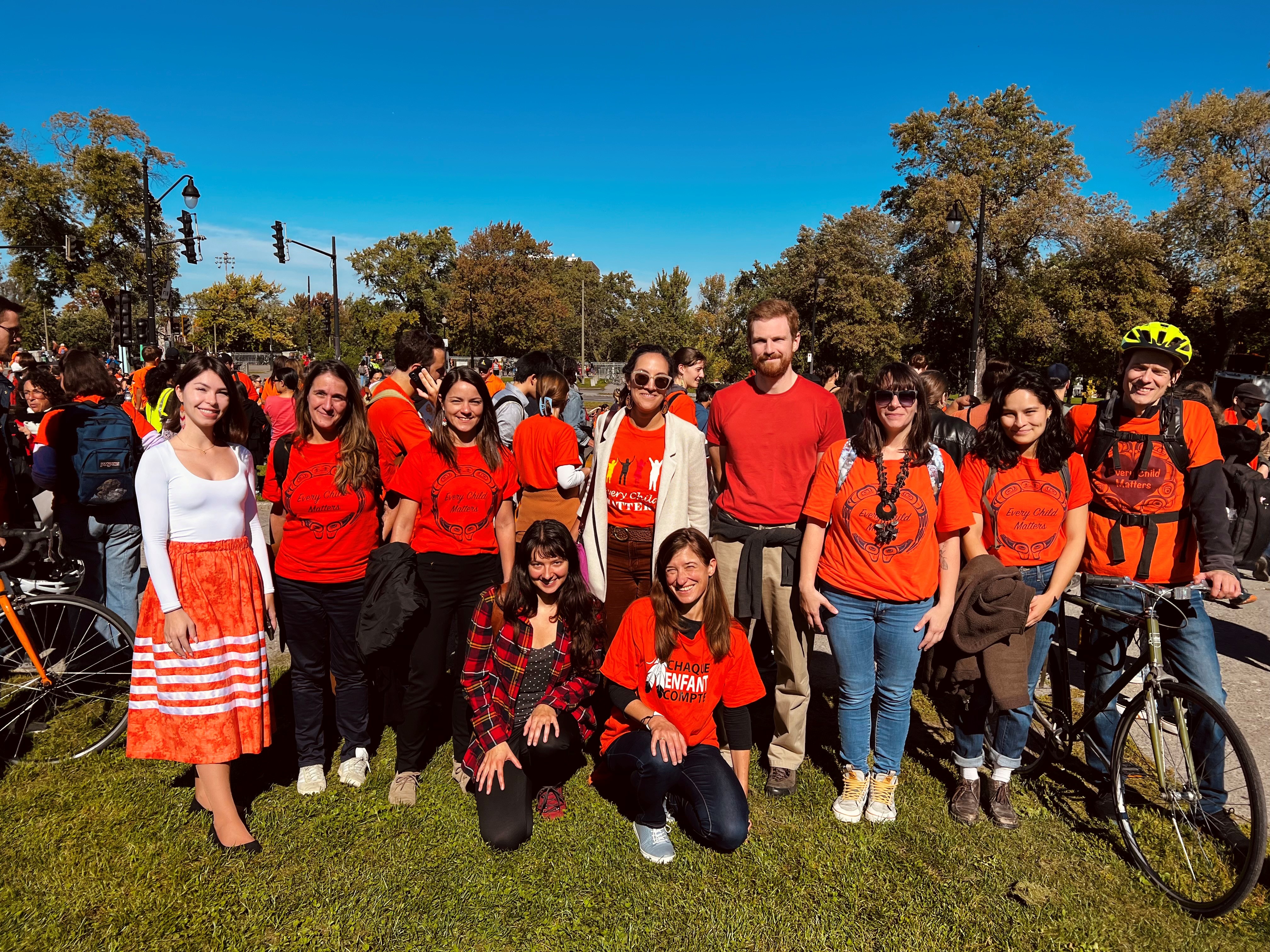 |
The establishment of a national Truth and Reconciliation Day was called for in the Truth and Reconciliation Commission’s Call to Action 80. It was important for Dionne Schulze’s team to participate in this event that put forward values that are fundamental to our practice with Indigenous peoples.
We encourage you to take part in this day and to take note of the many resources that speak to the challenges that must be overcome and the means to overcome them, including: |
- The Report of the Royal Commission on Aboriginal Peoples (October 1996);
- UN Declaration on the Rights of Indigenous Peoples (September 2005)
- Truth and Reconciliation Commission Reports (December 2015);
- The Final Report of the National Inquiry into Missing and Murdered Indigenous Women and Girls (June 2019);
- Public Inquiry Commission on relations between Indigenous Peoples and certain public services in Québec: listening, reconciliation and progress (Commission Viens) (November 2019);
- Coroner Gehane Kamel’s inquest report regarding the death of Joyce Echaquan (October 2021).
A lawsuit to recognize the cultural impact on communities
In French only:
Residential school: a lawsuit to recognize the cultural impact on communities – TVA Nouvelles, September 12, 2022 – David Schulze is quoted
A lawsuit seeking recognition of the impact of residential schools on Aboriginal communities, related to the loss of culture and language, has just begun at the Federal Court in Vancouver. The lawyers, representing 325 First Nations, more than half of all First Nations in the country, are seeking compensation for the collective impacts suffered.
Towards an economic development that is respectful of Indigenous Peoples
September 13th, 2022 marks the 15th anniversary of the United Nations Declaration on the Rights of Indigenous Peoples, which sets minimum standards for the survival and well-being of Aboriginal Peoples, including their right to protect their traditional territories.
Although many states and jurisdictions have already implemented it, the Government of Quebec has been slow to do so, fearing that the right of Aboriginal Peoples to free, prior and informed consent (FPIC) would be detrimental to economic development.
With the signatories from the business and justice communities, Aboriginal and non-Aboriginal, we argue in this open letter published September 13th, 2022 in Le Devoir that it is high time to implement the Declaration and that respecting FPIC will not prevent economic development but will promote development that is sustainable and respectful of First Nations and Inuit.
👉 You can read our open lettre here : LETTER UNDRIP
✍️ If you wish to join the list of signatories on our website, please contact Me Joëlle Perron-Thibodeau at .
Best Lawyers in Canada – 2023
Dionne Schulze is very pleased to announce that David Schulze and Elisabeth Patterson have been recognized by their peers among countless talented colleagues and will be honoured in the 17th edition of The Best Lawyers in Canada™ for their high-quality work in Aboriginal law / Indigenous practice.
Elisabeth Patterson has been recognized as the “Lawyer of the Year” for the Montreal area in Aboriginal law / Indigenous practice.
In addition, David Schulze is also listed among the best lawyers practising Aboriginal law for the 16th consecutive year.
Congratulations!
Constitution architecture dramatically altered following Quebec Appeal Court decision: legal experts
“Constitution architecture dramatically altered following Quebec Appeal Court decision: legal experts”, The Lawyer’s Daily, March 4, 2022 – Nicholas Dodd is quoted
The architecture of the Canadian Constitution has been dramatically altered, with the emergence of a third level of government, after the Quebec Court of Appeal ruled that Indigenous people possess an […]
Feb. 10, 2022 Quebec Court of Appeal judgment in Reference to the Court of appeal of Quebec in relation with the Act respecting First Nations, Inuit and Métis children, youth and families – Major Takeaways
“Major takeaways of the decision Reference to the Court of appeal of Quebec in relation with the Act respecting First Nations, Inuit and Métis children, youth and families”, by Nicholas Dodd
On February 10, 2022, the Quebec Court of Appeal released its judgment regarding the constitutionality of An Act respecting First Nations, Inuit and Métis children, youth and families. In finding the Act mostly constitutional, the Court emphatically confirmed that s. 35 of the Constitution Act¸1982 protects Indigenous peoples’ right to self-government. No appeal court in Canada has ever taken this step, and the Court’s judgment will have far-ranging consequences for the rights of Indigenous peoples. Jameela Jeeroburkhan and Nicholas Dodd of Dionne Schulze assisted an intervening party in preparing its written submissions and Nicholas has prepared a short summary of the major takeaways from the decision to help you understand more.
The Trans-Systemic Law Lab (In French only)
In French only
“The Trans-Systemic Law Lab“, in Focus Law by McGill University Faculty of Law, 2021-2022 – Portrait of Me Jameela Jeeroburkhan
Portrait of four people who attended law school at McGill between 1992 and 2016 – the span of a generation. What do they have in common? All four took turns doing research at the Paul-André Crépeau Centre for Private and Comparative Law, whose mission is to develop and promote the Canadian civil law tradition from a comparative perspective. And like many members of the McGill graduate community, this quartet has a lot to say!
Paul Dionne, founding partner of Dionne Schulze, named Advocatus Emeritus (Ad.E) by the Barreau du Québec
Paul Dionne, founding partner of Dionne Schulze, named Advocatus Emeritus (Ad.E) by the Barreau du Québec
Dionne Schulze is proud that one of its founders, Mr. Paul Dionne, a retired lawyer, is one of the recipients of the Advocatus Emeritus (Avocat Émérite) 2021 distinction.
The Ad. E. distinction is awarded by the Barreau du Québec to those amongst its members who have distinguished themselves by the excellence of their professional career, their exceptional contribution to the profession or their exceptional influence in their social environment which has reflected on the legal profession.
Mr. Dionne has had an exceptional career, the highlights of which are listed below. The Dionne Schulze team would like to congratulate him on this well-deserved honour!
Mr. Paul Dionne has represented Inuit organizations, as well as First Nations and tribal councils, with rigour and dedication, for almost 40 years. His practice included the negotiation of treaties, administrative agreements, specific claims and business contracts, as well as the defence of Aboriginal rights before the courts. He successfully represented First Nations in various cases before all levels of court, including the Supreme Court of Canada, and several Indigenous groups before parliamentary committees. He retired as of March 31, 2019. [Read more here (in French only)]
Granting Quebec river legal personhood, ‘changes our relationship with nature,’ Dionne Schulze lawyer says
“Granting Quebec river legal personhood, ‘changes our relationship with nature,’ lawyer says”, Lawyer’s Daily, 16 March 2021 – Sarah-Maude Belleville-Chénard is quoted
An internationally renowned white water river in Quebec was granted legal personhood, a first in Canada, in an effort to protect its ecosystems from future development following the adoption of two parallel resolutions by a local Indigenous community and municipality, setting the stage for a similar effort for the St. Lawrence River.
Nature and Its Rights
In French only
“Nature and Its Rights”, McGill University Faculty of Law, Winter 2021 – Sarah-Maude Belleville-Chénard is quoted.
The distinctive approach of McGill’s Faculty of Law provides fertile ground for cutting-edge thinking on the environment and sustainable development, as evidenced by three research projects conducted by members of this Faculty at the post-graduate level. Ms. Sarah-Maude Belleville-Chénard is leading one of these research projects and is attempting to understand the role and place of indigenous knowledge in the construction of the discourses on the rights of nature and their governance.
Death of the young Atikamekw woman, Joyce Echaquan – Interview with David Schulze, lawyer practicing in Aboriginal Law
In French only
“Death of the young Atikamekw woman, Joyce Echaquan – Interview with David Schulze, lawyer practicing in Aboriginal Law”, 98.5 Montréal radio station, 2nd october 2020
David Schulze talks about the Atikamekw community of Manawan, its history and its people.
Quebec judge rules in favour of Anishinaabe professor over Indian Act inequities
“Quebec judge rules in favour of Anishinaabe professor over Indian Act inequities”, CBC News, 11 August 2020 – Nicholas Dodd is quoted
Great win by Nicholas Dodd of Dionne Schulze: children of women who were enfranchised as unmarried adults will be treated the same as children of their sisters automatically enfranchised by marrying non-Indian men before 1985.
The Dionne Schulze team keeps its distances and its good spirits by maintaining cyber-communications
The Dionne Schulze team keeps its distances and its good spirits by maintaining cyber-communications. Our employees continue to work every day, from home, with dedication and passion on Aboriginal issues. Our cameras have captured not only the various backgrounds but also the everlasting heart that we put in our work. Do not hesitate to contact us by email or by phone if you need our firm’s help.
Absurdity ad infinitum: Status and the Indian Act
“Absurdity ad infinitum: Status and the Indian Act”, Anishinabek news, 25 February 2020 – Nick Dodd represents Karl Hele and is quoted
In 1985, the Conservative government officially ended enfranchisement with Bill C-31 and restored Indian Status to thousands of people albeit with some serious asterisks. Some of those asterisks were removed in 2011, 2016, and 2019. Yet, more remain encoded within section 6 of the current Indian Act.
Understanding Unceded Indigenous Territories
In French only:
“Understanding Unceded Indigenous Territories“, Radio Canada Info, February 18, 2020 – Interview with Elisabeth Patterson
In the context of the movement in support of the Wet’suwet’en Nation across the country, Me Elisabeth Patterson underlines in a televised interview on the 6:00 p.m. news the importance for the Government of Quebec to establish a constant and respectful dialogue with First Nations, especially regarding the new Quebec GNL pipeline project, which will go through several territories of First Nations who retain their ancestral rights.
Adopting UNDRIP into law
“Adopting UNDRIP into law”, The Canadian Bar Association, 15 January 2020 – Jameela Jeeroburkhan is quoted.
As Canada’s Liberal government works to implement the United Nations Declaration on the Rights of Indigenous Peoples, questions remain around what its impact will be in the Canadian legal context.
New Truth and Reconciliation website: a resource for the legal community
« New Truth and Reconciliation website: a resource for the legal community », CBA News, 13 September 2019
In August 2016, the Canadian Bar Association (CBA) adopted a resolution to take internal action in support of the TRC’s Calls to Action and, in 2018-2019, Ms. Jeeroburkhan sat on a CBA Task Force mandated to direct the organization on implementing this resolution. On September 13, 2019, the CBA task force’s work culminated in the launch of a new Truth and Reconciliation website (amongst other results), which is to be a communications vehicle for the entire Canadian legal community.
Radio interviews with David Schulze on the federal Indian day schools class actions
In French only:
Radio interviews with David Schulze on the federal Indian day schools class actions, SOCAM, 1st and 2nd of May 2019 – David Schulze is interviewed by Réjean Nequado and Tania Rock-Picard
In the coming months, the Federal Court will be asked to approve the settlement of a nationwide class action against Canada to compensate survivors for the harm they suffered while attending federally administered Indian day schools. The proposed settlement with Canada includes any person who attended a federal Indian day school, including First Nations, Inuit and Métis.
Beginning in 1920, the Government of Canada established and managed more than 700 Indian day schools. It is estimated that nearly 200,000 Aboriginal children (First Nations, Inuit, Métis, and Non-Status Indians) attended a federally run Indian day school. Many of these children have suffered trauma and, in some cases, physical and sexual abuse from persons whose duty it was to take care of these children.
The proposed settlement agreement was negotiated by the Government of Canada and the lawyer representing the McLean class members to resolve this dispute through conciliation and to find a lasting and tangible solution for former students of Indian day schools.
3 communities, Manawan, Obijewan, and Pessamit, called upon Mr. Schulze to pursue the class action file.
Maître Belleville-Chenard appointed to the Liaison Committee of the Bar with the Human Rights Tribunal
Dionne Schulze is proud of Ms. Sarah-Maude Belleville-Chenard, who was appointed in June 2018 to the Liaison Committee of the Bar with the Human Rights Tribunal.
Mandate of the Committee: To provide the liaison between the Montreal Bar and the Human Rights Tribunal, a tribunal that constitutes an important mechanism for the implementation of the rights and freedoms guaranteed by the Quebec Charter of Human Rights and Freedoms. The purpose of the committee is to discuss various issues raised by Tribunal members and lawyers in order to find solutions for the continuous improvement of the Tribunal’s operations.
In Person – Jameela Jeeroburkhan
“In Person – Jameela Jeeroburkhan”, CBA/ABC national, summer 2018
Jameela Jeeroburkhan is a partner at Dionne Schulze in Montreal, where she helps Indigenous clients navigate complex litigation and negotiates on their behalf with governments and industry. She is an executive committee member of the CBA’s National Aboriginal Law Section.

